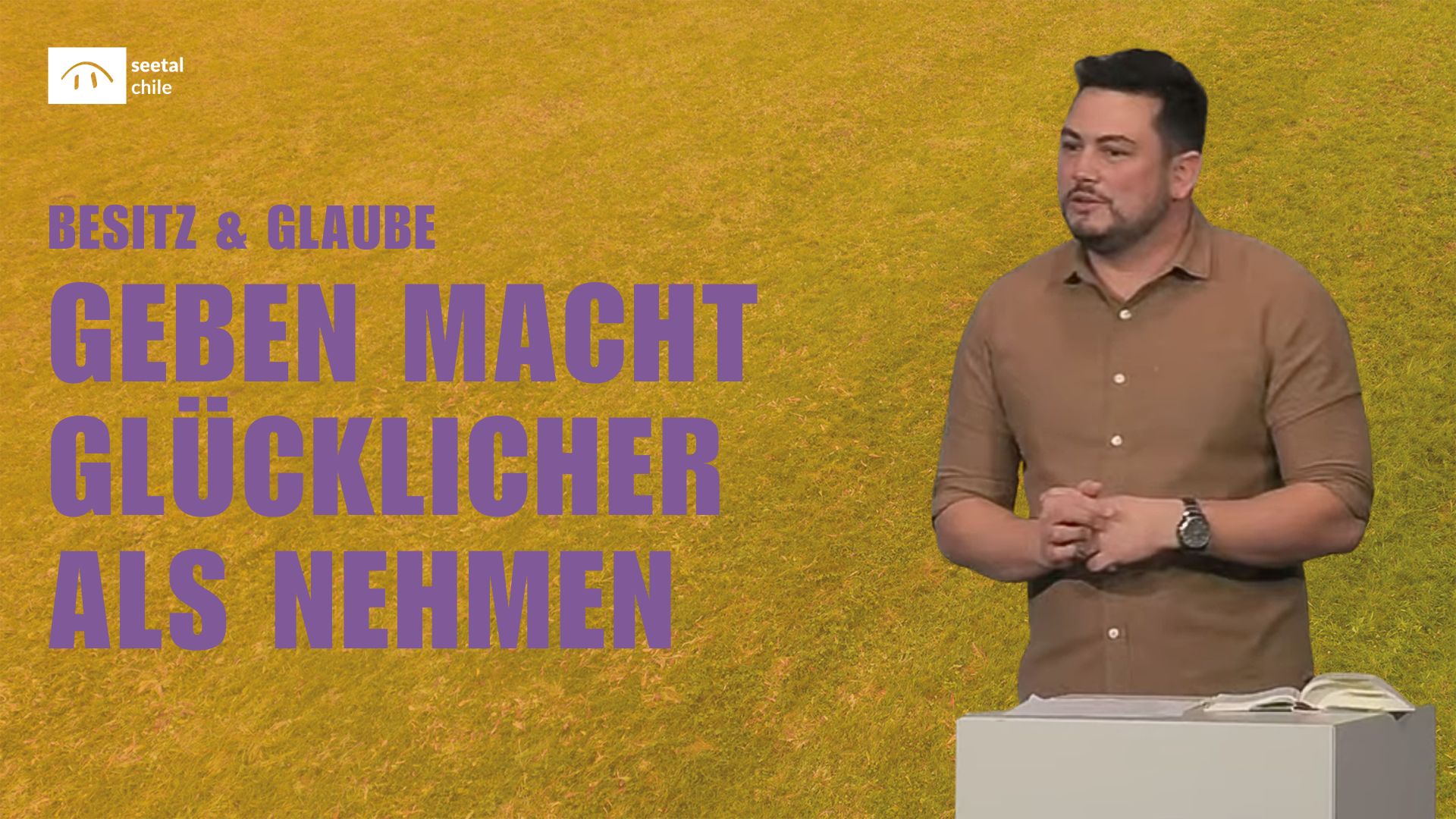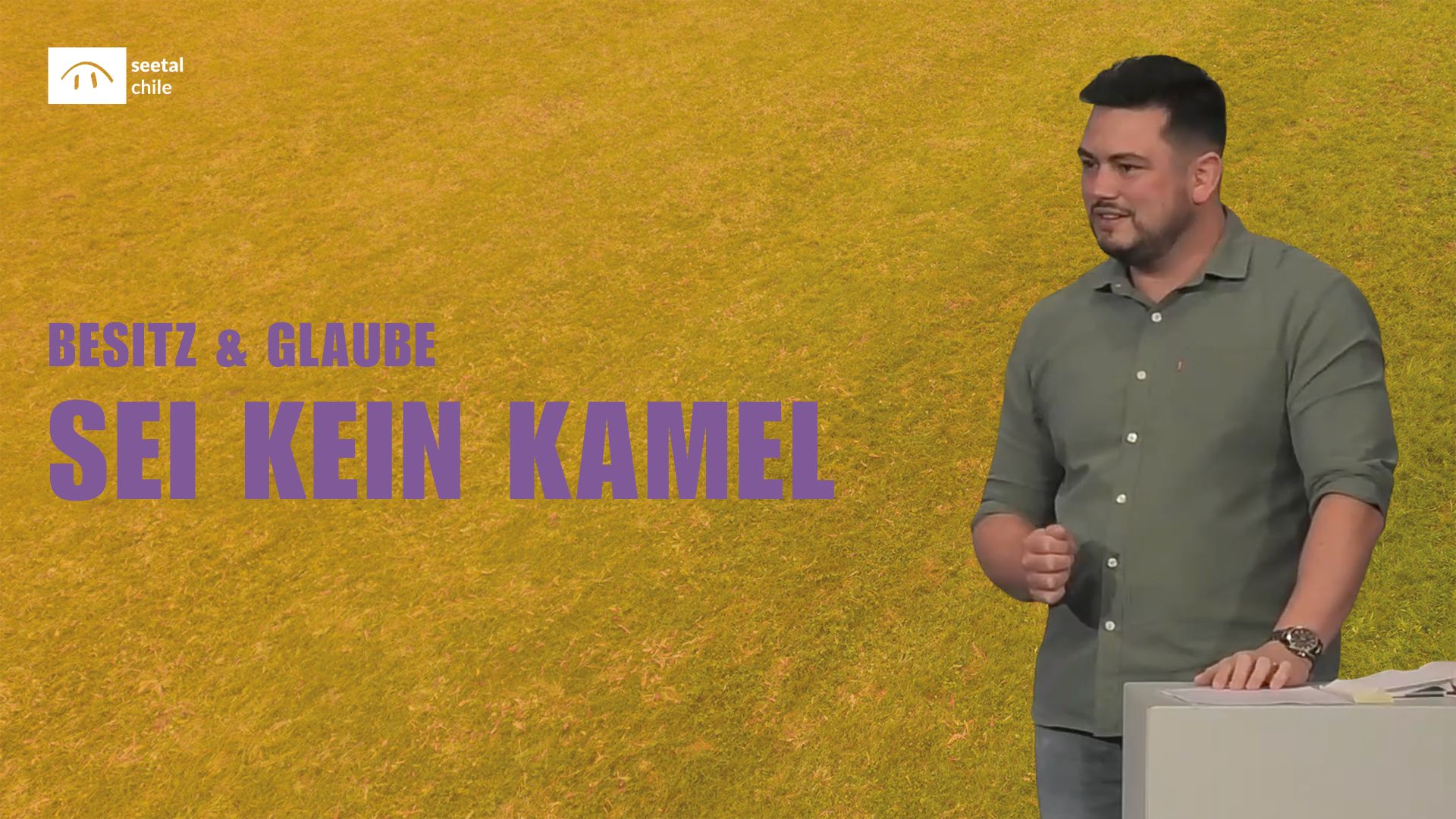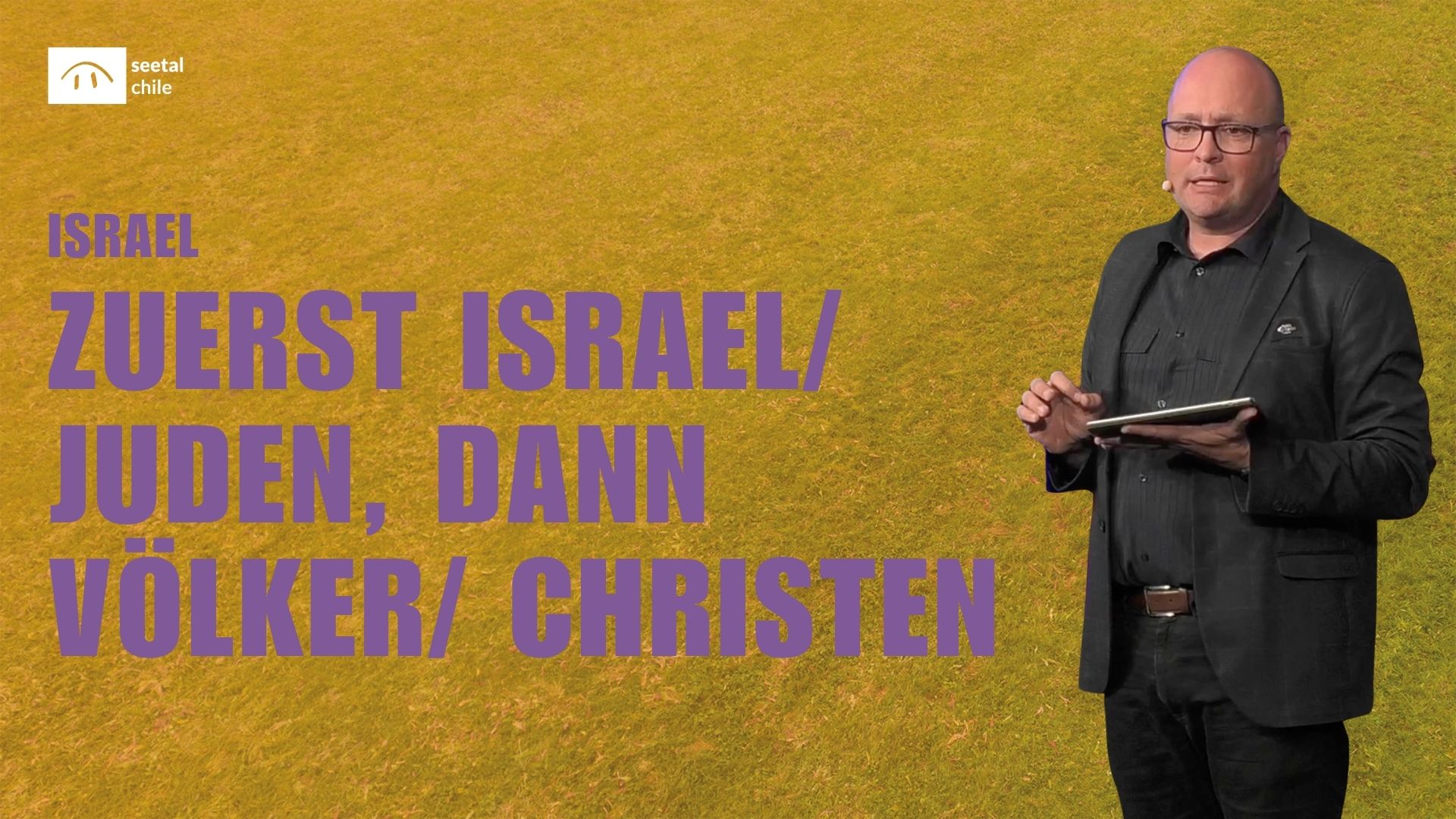Own heart & faith | Order your (heart) soil
Series: EIFACH muetig – with Jesus as a role model | Bible text: Matthew 13:3–9
God’s word is alive and powerful – it can transform hearts if we accept it. In the parable of the fourfold field, Jesus shows that the fruit does not depend on the seed, but on the soil: on the condition of our heart. Hard, superficial or divided hearts do not allow the word to work. But if you open your heart, nurture it and give God space, you will experience how his word takes root, grows and bears rich fruit.
Some boys pulled a high-spirited prank on New Year’s Eve. They sneaked into the church and stole the large altar Bible. Once home, they cut a hole in the inside of the book – without any respect – hid a powerful firecracker inside and connected the detonator to the cover. Carefully wrapped up, they left the Bible outside the vicarage door that night. On New Year’s morning, the vicar discovered the mysterious parcel. When he opened it, he was delighted to recognise the missing altar Bible. He gratefully opened it – but at the same moment, a huge bang shattered the silence. Scraps of paper flew through the air, and the priest stood in the midst of the chaos, covered in soot and scarred by the shock.
After he had composed himself and cleansed himself, he went into the church to hold the New Year’s service. He began his sermon with the unbelievable incident: «This morning the Bible literally blew up in my face» he said with a smile. «But you know what? If you open this book, you can expect explosions! Because it contains the dynamite of God – his power that changes lives.»
He spoke impressively about the living power of the Word of God, about the energy that lies hidden in the Holy Scriptures and transforms hearts. And now the question to you: Do you also experience «explosions» when you open the Bible? Do you feel how God’s Word changes, shakes up and renews your life?
The parable of the fourfold field shows us what obstacles stand in the way of this power – and at the same time how God’s word can unfold its full, life-creating power in an open heart.
The sower – God’s generosity
The first thing that strikes you is how generously this sower sows. He throws the grain on the path, on rocky ground, among thorns and on good land. He does not economise, he does not calculate where it is worthwhile – he sows everywhere.
God is like that. He does not withhold his word from anyone. He sows it in every heart, in every situation, in every time. His love does not differentiate between «good» and «bad» people. He also sows where we think nothing will grow! That shows: God’s word has power – it carries life within it.
The soil – our responsibility
The parable teaches us that the seed is always good. The word of God has power. But whether it bears fruit depends on the soil (of our hearts). This is our responsibility.
The path – the hard heart
«As he was scattering the seed over the field, some grains fell on a path, and the birds came and pecked them up» (Matthew 13:4 NLB).
A well-trodden path is hard. The grain cannot penetrate, it remains lying there – and is pecked away. Jesus explains: This is when someone hears the word but does not understand it; then the evil one comes and takes it away (v. 19). What kind of people are those for whom the seed falls by the wayside? A hard heart is often the result of habit, ignorance or hurt.
HabitHabituation is a psychological process in which the reaction to a repeatedly occurring stimulus becomes weaker over time or does not occur at all. The brain «gets used to» the stimulus and blocks it out because it is categorised as unimportant or harmless. At some point, we no longer consciously hear the church bells or the train in the neighbourhood. Our heart can also become «dulled» in this way. This is why the setting «Just keep exposing yourself to the word of God, it will work at some point!» not. «Today, when you hear his voice, do not harden your hearts as in rebellion» (Hebrews 3:15 SLT).
Ignorance: How quickly that can happen! We hear a sermon, read a Bible verse – but our thoughts are already back on appointments, worries, the news. The word remains on the surface. Another type of ignorance is listening to others and self-appointed guardianship. The former know exactly what the other person should hear, and the latter judge the sermon in a church service primarily on its accuracy. But what God’s word could mean for them remains in the mist.
InjuriesSome people literally became footpaths. Others have trodden on them – parents, a partner, a teacher. What remains is bitterness and pain. God’s word cannot take root in a hard heart. No one who wants to be good soil for God’s word can avoid the solution that Paul recommends: «Forgive one another, just as God forgave you through Christ» (Ephesians 4:32b NLB). Perhaps pastoral support is needed for this.
In the following verses (vv. 10–17), Jesus explains that the lack of understanding is self-inflicted and occurs in people who do not want to believe. This is where the first responsibility lies: open your heart! Don’t just let God’s word bounce off your heart, but let it fall into it – like Peter’s Pentecost sermon: «What they heard from Peter struck them to the heart, and they asked him and the other apostles, «Brothers, what shall we do?» (Acts 2:37 NLB). Whenever God’s word goes to the heart, the question of implementation follows. Ask the Holy Spirit for understanding – because God can break up even the ground that has been trodden down if we ask him to.
The rocky ground – the superficial heart
«Other seeds fell on a thin layer of soil with rocky subsoil. The seeds sprouted quickly, but the little plants soon dried out under the hot sun because the roots could not find any nourishment in the thin layer of soil» (Matthew 13:5f NLB).
Here, people hear the word and are enthusiastic. They accept it with joy, but as soon as difficulties arise – intellectual doubts, illness, persecution, loss – they turn away again. There is a lack of depth.
How often does this happen today: a sermon moves us, a song touches us – but after a short time everything is forgotten again. Faith remains a feeling, a mood, not a firm root. But the word of God wants to go deeper. It doesn’t just want to touch our emotions, but permeate our whole life – our everyday life, our decisions, our relationships.
Our responsibility is to preserve the word – not just to hear it, but to deepen it. This happens through regular reading, prayer, reflection and by applying it, even when it is difficult. Only a faith with roots can survive in the heat of daily difficulties and challenges.
The thorny ground – the divided heart
«Other seeds fell into the thorns, which grew quickly and suffocated the tender little plants» (Matthew 13:7 NLB).
Jesus explains: These are the people who hear the word, but the cares of this world and the deceitfulness of riches choke it, so that it remains without fruit (v. 22). This is probably the greatest danger of our time. Not open rejection, but overabundance. We are busy, overloaded, distracted. God’s word is given no space. The thorns grow unnoticed – worries, obligations, career, leisure time, possessions, constant digital bombardment. Our gaze is so absorbed by the visible that the invisible, the eternal, is suffocated. But a divided heart cannot bear fruit. Jesus says: «No one can serve two masters» (Matthew 6:24 NLB).
This is our responsibility: cut back the thorns! Clear out your heart. Find times of silence. Consciously place worries in God’s hands. Learn to discern what is really important. The word of God needs space, otherwise it will be suffocated.
The good land – the open heart
«But some of the seeds fell on fertile ground, and the farmer reaped thirty, sixty, even a hundred times as much as he had sown» (Matthew 13:8 NLB).
The good land is the heart that hears, understands and keeps the word. It is soft, attentive, obedient. It lets the word in deeply, holds on to it and allows it to work. The church in Thessalonica is a shining example: «We will never stop thanking God for the fact that you did not take the message we brought you for our own words. You received it as God’s word – which it truly is. And this word continues to work in all of you who believe» (1 Thessalonians 2:13 NLB).
Fruit means: the word changes us. It moulds our character, our faith, our actions. Fruit manifests itself in love, patience, gentleness and mercy. Fruit brings forth new life – in us and through us. It is interesting that the fruit varies in size: thirty, sixty, a hundredfold. God does not expect everyone to produce the same amount. He looks at faithfulness, not numbers. The decisive factor is that the word should work.
Our heart is like a field: it needs care, attention and cleaning. If it is left to its own devices, thorns will grow. If it becomes hard, nothing can grow. But if we plough it up regularly – through prayer, quiet listening, repentance and obedience – then God’s word will blossom in it.
Smith Wigglesworth, a man who has experienced much fruit, speaks of four principles:
- Read the Word of God. (Read the Word of God.)
- Consume the Word of God until it consumes you. (Consume the Word of God until it consumes you.)
- Believe the Word of God. (Believe in the Word of God.)
- Act on the Word of God. (Act on the Word of God.)
Encouragement – God gives growth
Despite all our responsibility, we can know that Growth comes from God. St Paul writes: «My task was to plant the seed in your hearts, and Apollos watered it; but it was God – not us – who made it grow. The important thing is not the one who plants or waters, the important thing is God, because he makes the seed grow» (1 Corinthians 3:6f NLB). We can prepare the heart – but God gives the fruit. Where his word falls into an open heart, something happens: faith grows, hope germinates, love matures. This is the power of the divine seed. That is why we can listen, believe and hope with confidence – and pray again and again: «Lord, speak your word into my heart and let it bear fruit for you.»
God’s word is like a hammer that shatters rocks (Jeremiah 23:29) and sharper than any two-edged sword (Hebrews 4:12). It is our responsibility whether this energy can bear fruit in our lives up to a hundredfold.
An old prayer says: «Lord, make my heart a good land in which your word has taken deep root. Let what you yourself have sown grow, so that it bears fruit that will stand forever.»
Possible questions for the small groups
Bible text: Matthew 13:18–23
- Which «heart soil» best describes me at the moment – and why?
- Where do I experience that God’s word bears fruit in me – and where do I find it difficult to take root?
- What «thorns» or distractions stifle the work of the Word of God in my everyday life?
- How can I consciously «dig up» my heart and keep it open to God’s word?
- When was the last time I experienced that God’s word made something «explode» in me – a real change or new realisation?




